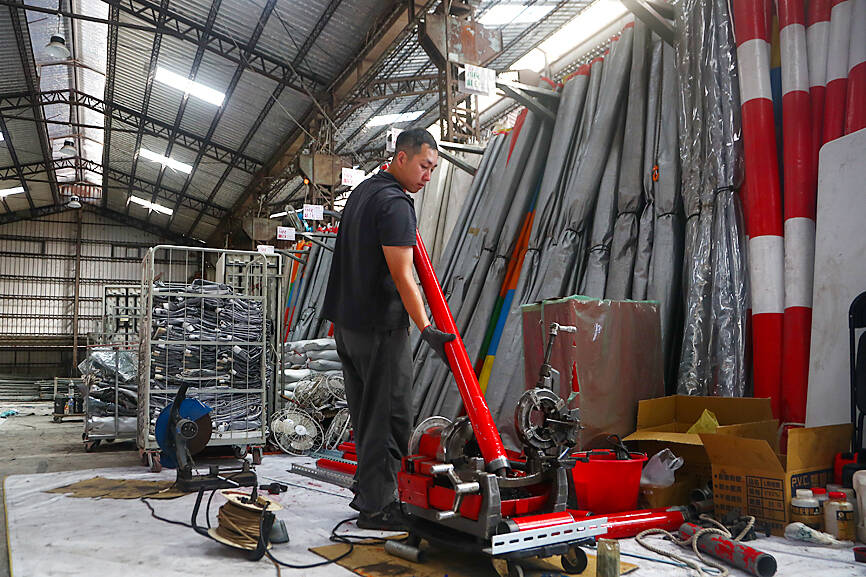Taiwan’s economy maintained steady momentum last month, with the government’s business climate monitor flashing a “green” light for the third consecutive month, signaling stable expansion despite rising external risks, the National Development Council (NDC) said yesterday.
The gauge printed 29 last month without change in any of its nine components, underscoring the economy’s resilience even in the absence of growth drivers, the council said.
“As long as artificial intelligence demand remains strong, the state would be sustainable in the second half of this year even after the US imposes a 20 percent tariff on goods from Taiwan,” NDC Department of Economic Development Deputy Director Chen Mei-chu (陳美菊) said at a news conference in Taipei.

Photo: CNA
The Directorate-General of Budget, Accounting and Statistics earlier this month lifted its forecast for GDP growth this year to 4.45 percent from the 3.1 percent forecast in May, citing stronger exports of chips and related products.
The latest data showed that private consumption and the labor market are still holding up, although traditional and non-tech industries continue to face headwinds, Chen said.
The council’s leading index,, which seeks to project the economic state over the next six months, pointed to softer momentum ahead, printing 98.6, down 0.7 percent from one month earlier.
The retreat stemmed from weaker export orders, business sentiment and construction activity, the council said.
In contrast, the coincident index, a measure of current conditions, climbed 0.28 percent to 106.2, marking its 27th straight month of gains on the back of robust exports, electricity consumption, manufacturing sales, industrial output and imports of capital equipment, it said
Overall, local businesses remain wary of the global trade environment, especially Washington’s planned tariffs on semiconductors, Chen said.
Many companies have diversified their global investment footprints. Taiwan Semiconductor Manufacturing Co (台積電), the world’s top contract chipmaker and a critical supplier to Apple Inc and Nvidia Corp, has expanded its capacity in the US to minimize tariff exposure.
As long as global artificial intelligence demand stays robust, Taiwan is expected to maintain its pivotal role in the supply chain, she said.

NEW IDENTITY: Known for its software, India has expanded into hardware, with its semiconductor industry growing from US$38bn in 2023 to US$45bn to US$50bn India on Saturday inaugurated its first semiconductor assembly and test facility, a milestone in the government’s push to reduce dependence on foreign chipmakers and stake a claim in a sector dominated by China. Indian Prime Minister Narendra Modi opened US firm Micron Technology Inc’s semiconductor assembly, test and packaging unit in his home state of Gujarat, hailing the “dawn of a new era” for India’s technology ambitions. “When young Indians look back in the future, they will see this decade as the turning point in our tech future,” Modi told the event, which was broadcast on his YouTube channel. The plant would convert

‘SEISMIC SHIFT’: The researcher forecast there would be about 1.1 billion mobile shipments this year, down from 1.26 billion the prior year and erasing years of gains The global smartphone market is expected to contract 12.9 percent this year due to the unprecedented memorychip shortage, marking “a crisis like no other,” researcher International Data Corp (IDC) said. The new forecast, a dramatic revision down from earlier estimates, gives the latest accounting of the ongoing memory crunch that is affecting every corner of the electronics industry. The demand for advanced memory to power artificial intelligence (AI) tasks has drained global supply until well into next year and jeopardizes the business model of many smartphone makers. IDC forecast about 1.1 billion mobile shipments this year, down from 1.26 billion the prior

People stand in a Pokemon store in Tokyo on Thursday. One of the world highest-grossing franchises is celebrated its 30th anniversary yesterday.

Zimbabwe’s ban on raw lithium exports is forcing Chinese miners to rethink their strategy, speeding up plans to process the metal locally instead of shipping it to China’s vast rechargeable battery industry. The country is Africa’s largest lithium producer and has one of the world’s largest reserves, according to the US Geological Survey (USGS). Zimbabwe already banned the export of lithium ore in 2022 and last year announced it would halt exports of lithium concentrates from January next year. However, on Wednesday it imposed the ban with immediate effect, leaving unclear what the lithium mining sector would do in the